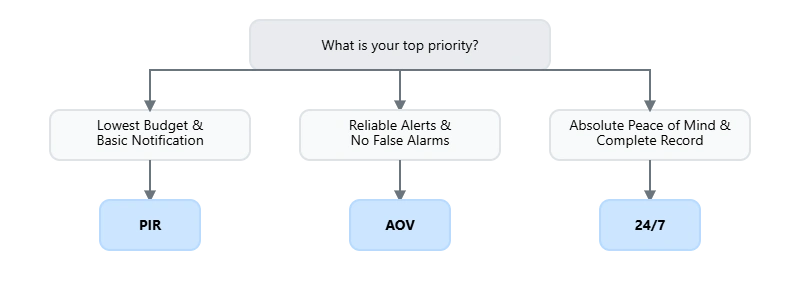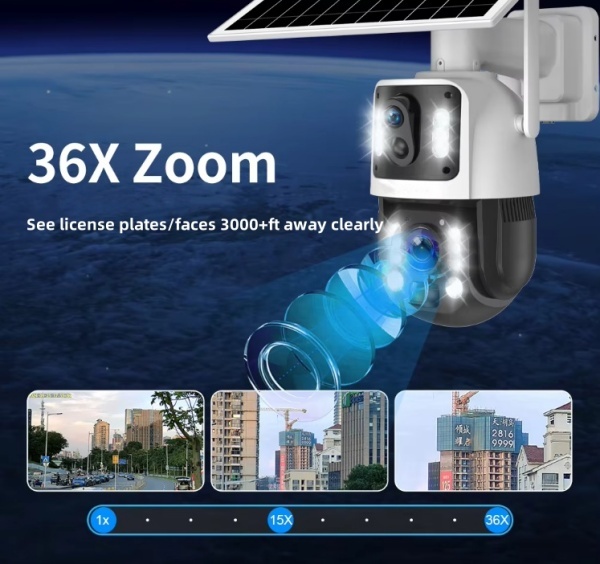PIR vs. AOV vs. 24/7 Solar Camera: The Ultimate 2025 Buyer’s Guide
If you’re shopping for a solar-powered security camera, you’ve undoubtedly been bombarded with terms like PIR, AOV, and 24/7. What’s the real difference? And which one is actually the best?
Don’t worry, you’re not alone. As security technology experts, we answer these questions every day. This guide will break down the differences in the simplest terms and help you make the smartest choice.
Spoiler alert: This isn’t a question of “which is better,” but a story of “technological evolution” and “which is better for you.”
The Core Difference: It’s All About Power Management
First, you need to understand one fundamental fact: unlike a wired camera with unlimited electricity, a solar camera must operate on a “finite power budget.” Therefore, these three modes are essentially three different power management and recording strategies.
- PIR is designed for “maximum power saving.”
- AOV is designed for the perfect “balance between power saving and reliability.”
- Intelligent 24/7 is designed for “ultimate reliability” when technology and power allow.

Clear Definitions: Pros and Cons of Each Mode
PIR Mode (Passive Infrared): The Basic Guard
- How it Works: The camera is in a deep “sleep” state most of the time. It only wakes up and starts recording when its PIR sensor detects a change in heat from an object (like a person or animal).
- Pros:
- Extreme Power Saving: Offers the longest battery life and has the lowest requirements for the solar panel and battery.
- Low Cost: Mature technology, making it standard for entry-level products.
- Cons:
- Recording Delay: There’s a 1-3 second delay from wake-up to recording, often resulting in only capturing the back of a target.
- Prone to False Alarms: Can’t distinguish between people and animals; swaying leaves or a passing cat can trigger an alert.
- Who is it for? Budget-conscious users placing a camera in a very low-traffic area (like a backyard corner) who just need to “know something happened.”
AOV Mode (Always On Video): The Intelligent Detective
- How it Works: The camera is always “on” in an ultra-low-power state, pre-recording footage. When its built-in AI algorithm (not PIR) identifies a specific target (like a person or vehicle), it instantly saves a complete high-definition video that includes the crucial seconds before the event.
- Pros:
- Zero-Delay Recording: Perfectly captures the entire event from start to finish.
- High Accuracy: The AI algorithm filters out over 95% of irrelevant motion, drastically reducing false alarms.
- Efficient Management: You only receive valuable event alerts, saving you from wasting time on useless clips.
- Cons:
- Higher power consumption than PIR mode.
- Only records “events,” not the empty time in between.
- Who is it for? This is today’s mainstream and best choice for most people. It’s perfect for the vast majority of homes, farms, and job sites where users want reliable, accurate, and efficient alerts. Our “Home Guardian” Series is a prime example of AOV technology.
Intelligent 24/7 Mode: The Ultimate Recorder
- How it Works: This is the ultimate form. It both performs non-stop 24/7 recording AND runs AOV’s AI analysis simultaneously. In the end, you get a complete 24-hour video timeline where all key events (people, vehicles, etc.) have been automatically marked for you.
- Pros:
- Absolute Completeness: You have every second of raw footage, providing forensic-level evidence and ultimate peace of mind.
- Intelligent & Convenient: It solves the “finding a needle in a haystack” problem of traditional 24/7 recording. You can jump directly to events from a list or scrub through the full timeline.
- No Compromises: Perfectly combines the benefits of “complete recording” and “smart filtering.”
- Cons:
- Highest Power Consumption: Requires a very powerful solar panel (e.g., 10W+) and a large-capacity battery (e.g., 20000mAh+).
- Highest Cost: This is a feature reserved for flagship products.
- Who is it for? Users with the highest security demands. This includes commercial properties needing to meet compliance, critical entry points requiring forensic review, or any individual who wants a “no-stone-unturned” security setup. We invite you to explore our Intelligent 24/7 PRO Series.
At-a-Glance: PIR vs. AOV vs. 24/7 Comparison Chart
| Feature | PIR Mode | AOV Mode | Intelligent 24/7 Mode |
|---|---|---|---|
| Recording Trigger | Heat Motion | AI Recognition | Continuous |
| Video Integrity | ⚠️ Delayed, Incomplete | ✅ Complete Event | ✅✅ Absolutely Complete |
| Playback Experience | Event clips only | Event list, efficient | Event list + Full timeline |
| False Alarm Rate | High | Very Low | Very Low (for markers) |
| Power Consumption | Lowest | Medium | Highest |
| Recommendation | ⭐⭐ | ⭐⭐⭐⭐⭐ | ⭐⭐⭐⭐ |
| Best For | Low-traffic, low-budget | Most modern security needs | High-security, compliance |
How Do I Choose? A Simple Decision Guide
- Choose PIR if: Your budget is extremely limited and the monitored area has almost no activity.
- Choose AOV if: You want a reliable, smart, and hassle-free modern security system that accurately tells you what happened. This is the best choice for 90% of users.
- Choose Intelligent 24/7 if: You demand ultimate peace of mind, cannot afford to miss anything, need a complete evidence trail, and have a sufficient budget.

Frequently Asked Questions (FAQ)
Q1: Can a solar camera really record 24/7?
A: Yes, but only if it’s equipped with a sufficiently powerful solar panel (like 10W or more) and a very large battery (like 20000mAh or more) to survive consecutive cloudy days. This is why it’s typically a feature on flagship models.
Q2: What makes AOV so much better than PIR?
A: AOV is superior to PIR in every practical way. It solves PIR’s biggest pain points—recording delay and high false alarm rates—to provide a truly reliable event monitoring experience.
Q3: Does 24/7 mode use a lot of cellular data?
A: The recording itself is stored on a local SD card or in the cloud and does not consume 4G data. Data is only used when you remotely live-view or play back footage. The advantage of Intelligent 24/7 is that the event list helps you find videos quickly, reducing the data wasted on aimless playback.
Conclusion: Choose the Tech That Matches Your Security Philosophy
PIR, AOV, and Intelligent 24/7 represent three eras of solar security technology. PIR solved the problem of “having anything at all,” AOV solved the problem of “being useful and reliable,” and Intelligent 24/7 solved the problem of “being perfect.”
At Uboxcam, we know that no single solution fits everyone. That’s why we offer a full range of solutions, from efficient AOV to ultimate Intelligent 24/7, ensuring every user can find a security partner that perfectly matches their needs.
- Explore our AOV Smart Camera Series and experience the efficiency and convenience of AI.
- Discover our Intelligent 24/7 PRO Solutions and give your critical assets the ultimate protection.
2025 Smart 24/7 solar security camera-SDL500 36X

